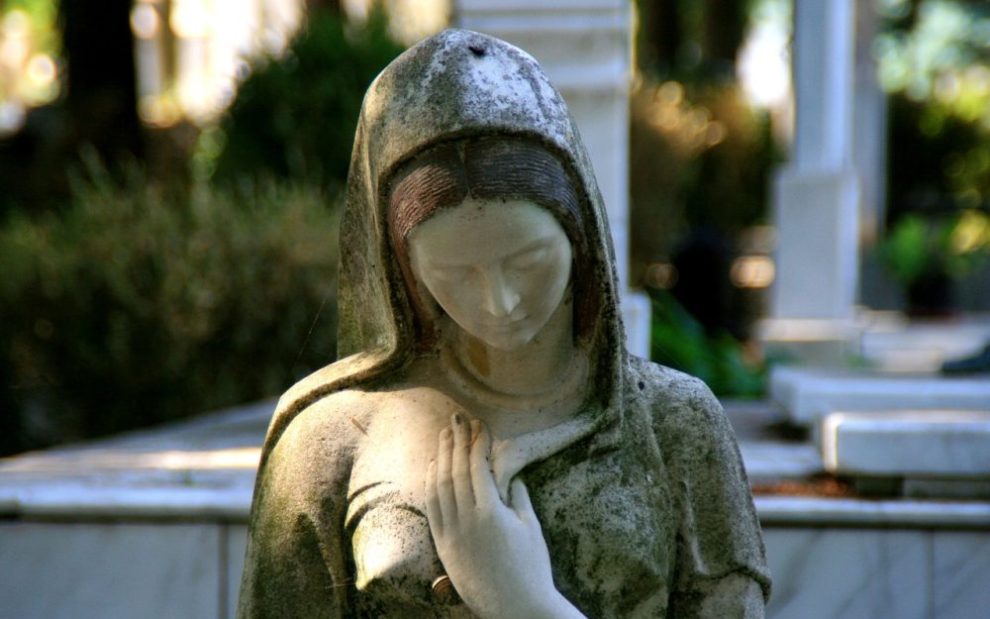When I was a young adult, I didn’t think I was a feminist.
This was not because I didn’t want the same opportunities men had. At the evangelical ranch, camp, and retreat center where I worked, I was told that it was “unbiblical” for women to be in positions of authority over men, and that was why I couldn’t be promoted from assistant to barn manager. Women were not expected to drive the tractors, because this was somehow unfeminine, so if I needed the manure spreader brought in or a load of hay moved I had to find a man to operate the machinery.
Then I went to a Catholic college that is regularly ranked among the top 10 conservative institutions in the nation. I considered journalism and English as options for majors, toyed with the idea of physics, and eventually decided to pursue a philosophy degree. But despite my good grades and willingness to engage in debate, I was told repeatedly that, as I was a woman, logic was probably not going to be my strong suit. While most of my professors were supportive of my career ambitions, some implied that the philosophy department, where the ratio of men to women was something like 12:1, might be a good place for me to find a husband. I resented the implication that my scholarship was somehow less worthy and disliked the academic culture in which men clustered around talking about serious scholarly topics while women were expected to cluster separately talking about relationships and child-rearing.
Despite my resentment of enforced inequalities and sexist stereotypes, I still did not call myself a feminist. Feminism told me that men and women were equal and that women were as capable of leadership as men were, as worthy of filling such diverse leadership roles as politician, orchestra conductor, project manager, military officer, or pastor. But patriarchal, conservative Christian leaders told me that God had made women to be submissive to men, to be “helpmeets.” And for the most part the women in my conservative Christian circles seemed happy to be submissive, powerless, and emotion driven. Many even made a point of cultivating these traits as “authentically feminine.” A book called Fascinating Womanhood made the rounds on campus in the 1990s. It instructed young women how to use their feminine charm to fascinate men and get men to treat them well. We were told to be childlike and angelic, not to be seen reading dry or difficult books, and never to be bossy.
The “pick me” woman, the one who’s “not like other girls,” flourishes in such spaces, and I must sadly confess that I leaned into that trope. I was young and anxious about my identity in the world. Setting myself apart from the girly girls as someone who enjoyed being independent and breaking glass ceilings was an easy way to do this, especially since so many of the other women at that university seemed delighted to follow the prescriptions of Fascinating Womanhood, happy to defer to men.
Student life encouraged this, enforcing a rigid gender binary both in its insistence on radical gender segregation and in its punishment of LGBTQ+ students. Events for men were all about “Christian manhood”: leadership, cigars, and books. Events for women were all about femininity and our future vocations as wives and mothers. Chastity speakers regularly appeared on campus to talk about how easily our purity could be damaged by a single sexual encounter. We would end up as a rose with its petals torn off, a chewed-up piece of gum. My friends and I mocked these speakers as well as the flyers advising “Mary-like modesty” that sometimes appeared on the walls and bulletin boards. We took to smoking cigars outside the classroom building just to alarm the men.
Still, despite my fervent opposition to the entire culture of gender complementarianism, it did not occur to me to identify as a feminist. Why would I, when the women around me were happily modeling everything the patriarchy said women liked and wanted?
The philosopher Mary Wollstonecraft, writing over 200 years ago, identified the way sexism operates as self-fulfilling prophecy. If women are constantly encouraged to perform an infantile version of femininity, steered away from education, shamed for advocating for themselves, and rewarded for submission to patriarchal decrees, ultimately many women will work to conform to certain stereotypes about being “emotional” or “frail.” Additionally, when women perform this variation on femininity, we are less able to claim our autonomy or set boundaries. We are pressured to trade our birthright of personal self-ownership for the dubious benefit of male protection.
The same university I attended—where we were bombarded with propaganda about femininity, modesty, and set gender roles—has been in the news lately for hosting a conference on post-liberal integralism, that is, a political ideology that eradicates the separation between church and state and attempts to set up a right-wing Catholic theocracy. The university has also been in the news due to a series of sex abuse cover-ups involving some of the priests and employees at the highest levels of administration. A majority of the victims are young women.
These two news items are not accidental. Oppression and subjugation of women, denial of our autonomy, and enforcement of rigid gender binaries are part of a larger agenda that is vehemently opposed to equality, diversity, and, ultimately, social justice across the board, not just for women but for LGBTQ people, refugees, and racial and ethnic minorities. Keeping smart, independent women from identifying as feminist is part of how they maintain this agenda. Whether the women are more comfortable acting out submission or more comfortable putting their gifts and talents in the service of the patriarchy, either way the goal is to keep us from uniting and working for justice and representation. When patriarchal forces enlist rhetoric about God’s will and harness the power of religion to keep women silenced, it is all the more difficult to extricate oneself from this culture. We are told that our protests are rebellious and sinful.
It is ironic that conservative religious leaders told us to imitate Mary when they wanted us to be meek and submissive, because Mary of Nazareth was the opposite of the delicate, rosy-cheeked maiden they imagine The young woman who courageously chose to defy cultural norms, who assented to a cooperative project with God without consulting the men in her family, who sang a song glorifying God for “casting down the mighty from their thrones,” is not the Mary they were looking for. But it is the Mary whom some of us found anyway. And in Mary we find not a docile handmaiden of the patriarchy nor a weapon of the patriarchy, but an ally for women and for all who are struggling.
One of the most freeing and empowering choices I am making, as a woman in my middle years, is the choice to support and encourage other women, especially those who are younger and still attempting to extricate themselves from toxic ideologies. Many of these younger women have access to resources that did not exist when I was their age, including online communities where they can find validation as they work to achieve liberation and claim their identities. They have learned to name patriarchy, sexism, homophobia, transphobia, ableism, and fatphobia and other harmful prejudices that limit human beings and pit us against one another and against ourselves. But young women also face a host of challenges that I never experienced, including online bullying and social media trends that enforce harmful beauty standards. And they look toward a grim future where economic collapse and climate catastrophe are likely.
Instead of scorning other women as lesser or fighting with them for the meagre scraps the patriarchy throws from its table, I am finding it more rewarding to fight for better protection of the rights and dignity of all women. As I fret less about my clothing or my physique, I can focus more on the things that matter such as working for better communities that offer women real support and on fighting the forces that try to keep us passive, uncertain, and self-doubting. As I worry less about whether I am supposed to be being full of sweetness and charm, I find strength in the very qualities I was told were unfeminine: my anger, my impatience, my combativeness, my rebellion.
Once upon a time, people tried to tell me that these traits made me a bad woman—less like the modest, docile Mary we were supposed to emulate. That Mary, I realize, existed only in their imaginations. The real Mary is a figure of courage, autonomy, and resistance and an ally and advocate to women and all who struggle for liberation.
I’m doing my best to follow her example.
Image: Pixabay/AdinaVoicu













Add comment